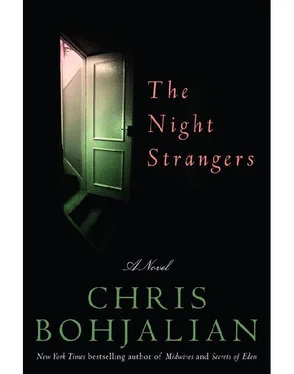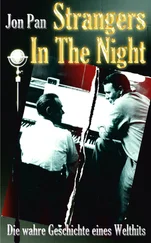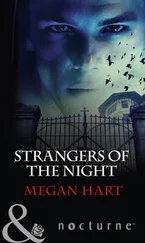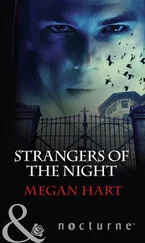Chris Bohjalian - The Night Strangers
Здесь есть возможность читать онлайн «Chris Bohjalian - The Night Strangers» весь текст электронной книги совершенно бесплатно (целиком полную версию без сокращений). В некоторых случаях можно слушать аудио, скачать через торрент в формате fb2 и присутствует краткое содержание. Жанр: Триллер, на английском языке. Описание произведения, (предисловие) а так же отзывы посетителей доступны на портале библиотеки ЛибКат.
- Название:The Night Strangers
- Автор:
- Жанр:
- Год:неизвестен
- ISBN:нет данных
- Рейтинг книги:5 / 5. Голосов: 1
-
Избранное:Добавить в избранное
- Отзывы:
-
Ваша оценка:
- 100
- 1
- 2
- 3
- 4
- 5
The Night Strangers: краткое содержание, описание и аннотация
Предлагаем к чтению аннотацию, описание, краткое содержание или предисловие (зависит от того, что написал сам автор книги «The Night Strangers»). Если вы не нашли необходимую информацию о книге — напишите в комментариях, мы постараемся отыскать её.
The Night Strangers — читать онлайн бесплатно полную книгу (весь текст) целиком
Ниже представлен текст книги, разбитый по страницам. Система сохранения места последней прочитанной страницы, позволяет с удобством читать онлайн бесплатно книгу «The Night Strangers», без необходимости каждый раз заново искать на чём Вы остановились. Поставьте закладку, и сможете в любой момент перейти на страницу, на которой закончили чтение.
Интервал:
Закладка:
You pull your knees into your chest, if only because you believe this is the posture that behooves one in the midst of a stint in the pit of despair. You think of Poe and amontillado. A cask. Building stone and mortar. A trowel. Or, in this case, barnboard and thirty-nine six-inch-long carriage bolts. You bow your head against your drawn knees and breathe in the aroma of cold, cold dirt and mold. The air is a little stale.
In the unlikely event the cabin loses pressure, an oxygen mask will descend…
How many times had you heard that-or some version of that-in the cabin behind you while you were waiting to leave the gate? You always will miss that. The calm before… not the storm. The calm before the serenity of flying. How you loved flying.
You feel a sharp spike in your lower back, as if you have leaned against a protruding nail, and reflexively you wince. Just in case, you sit forward and run your hand over the wood behind you. It’s rough against your fingertips, but there is nothing spiking out from the beams. This pain is-as you presumed when you felt it-merely one of those strange, mystery aches that have dogged you since August 11.
“It was noisy under the water.”
Your head swivels instinctively toward the voice at the same time that your body jerks away from it, and your shoulder smacks hard into the gritty timbers beside you. But the voice is more startling than frightening. There, sitting next to you in the pit, is the child from the plane with the blond spit curls, her hair now wet with lake water and flattened against her scalp, who had boarded Flight 1611 with the Dora the Explorer backpack. The backpack is, in fact, in her arms even now, and she is sitting almost the way you are. Her arms are around her matchstick-like legs. You notice a bruise on one knee and a scratch on the other. Kiddie knees, Emily would call them. Too much tree climbing. Her uninflated life jacket looks like a bib.
“When I would have my head underwater at the swimming pool, it was always quiet,” she continues, her voice offhand, as if the two of you have known each other for years, “but that day in the lake? It was really, really noisy.”
When you think back to that moment, you realize she’s right. It was noisy. There were those ferryboat engines, which were much louder when you were in the water than when you were up on the deck, and the screams and shrieks from the passengers and the rescuers. There was a Coast Guard boat’s ululating siren. There was the chaotic, unorchestrated thwapping of the churned-up water and waves. And so you nod like a dad and tell the girl she is correct. You agree. Then you hear yourself asking the child her name, as if she is a slightly younger friend of Hallie and Garnet and you are sitting in a school classroom or, perhaps, at a Brownie picnic. (You wonder: Will your girls find a Girl Scout troop here or will this passage to the north lead them to leave the scouts altogether?)
“Ashley. I have two cats and a dog,” she tells you. “Your cat is huge. Much bigger than mine. Do you have any other pets?”
“Nope. Just Dessy. It’s short for Desdemona. And you’re right: She is a very big girl.”
“My cats are Mike and Ike. I didn’t name them. The animal shelter did. They were from the same litter, and the shelter named them after some candy because they loved each other so much as kittens and they were, like, always together. My dog is named Whisper. I got to name her. She’s a mutt, but she looks a little like a beagle.”
You wish you had gotten another dog after your chocolate Lab, Maxie, passed away the year before last. You would have liked to have had a dog here in the country. You would have liked to have had one to walk this past autumn when you were sleepwalking through life in Pennsylvania in the months after the crash. Desdemona might not have minded. She’d always seemed to like Maxie. But if you’d gotten a new dog, it would have been a puppy, and it’s possible that Desdemona would have had far less patience with the hysterical antics of a three-month-old Lab.
“Ashley’s a pretty name.”
“I don’t have a Mary-Kate.”
“I didn’t think so,” you tell her. You find yourself smiling, even though the child’s wet clothes are making the dirt between you turn to mud. Only recently have your daughters outgrown the Olsen sisters. “But you know what? My children are twins. I have twin girls.”
“I know.”
Of course she does. She knows about Dessy. Why wouldn’t she know about Hallie and Garnet?
“Most people think twins always look the same,” she tells you with great earnestness. “But I know that only happens sometimes. I have cousins who are twins, and one’s a boy and one’s a girl. It would be pretty weird if they looked identical! My family sometimes jokes about how Andrew-he’s the boy-is older than Becca. But it’s only by, like, a couple of minutes. Who’s older in this house: Hallie or Garnet?”
“Hallie but, like Andrew, only by minutes. Hallie is named after her grandmother. And her sister is named Garnet, because her hair was so very, very red when she was born.”
The child nods, taking this in. “Those are very pretty names.”
“I think so.”
Ashley stretches out her legs so she can open her backpack. She unzips the top and peers in for a moment. Then she turns to you, her face growing sad, and you reach out your arm to rub her shoulder, to console her. Suddenly she bends forward, bowing almost, grimacing, and your eyes go to her lower back, that precise spot on your own back where only moments ago you had felt a sharp sliver of pain. And then you gasp and, as if she were your own child, turn the girl away from you so you can examine more carefully the wound and see what you can do to help her. There you see a twisting corkscrew of metal nearly the size of a skateboard, a part of it adorned with the sky blue paint your airline uses to brighten the exterior fuselages of its jets, impaling the child from her back to her front. Perhaps seven or eight inches of the metal is extending from just beneath the front of her ribs-you must have missed it earlier because of her life jacket and knapsack-and at least a foot reaches out from her back like a shelf. Her clothing is awash in blood and flesh, and there are tendrils of muscle twitching like small black snakes from the holes that have been gashed through both sides of her shirt.
You can’t imagine what you can possibly do to help her-you can’t imagine what anyone could do-you can’t think of anything you could say to ease her agony and her fear. But, still, you reach for her because, after all, you are a father. Because you are an adult and you have to do something. Gently, so as not to jostle her and cause that great shard of metal to move inside her and cause her yet more agony, you wrap your arms around her. But when you press your fingers on the back of her shirt, you feel only air and she is gone.
You sigh. Your heart slows. You drop your hands to your sides and then, a moment later, touch the pinpricks of pain at the small of your own back.
She was never really there, you tell yourself. Yes, you recall there was a child on the plane named Ashley. You know this from the passenger manifest. You know this from the list of the dead. Ashley Stearns. She was seated beside her father, Ethan Stearns. But of course you just fabricated in your mind this whole brief conversation. You will be careful not to tell Emily. Or Michael Richmond, your new therapist here in New Hampshire. Already you worry them both. So, you will share this… this vision… with no one.
You run your fingers through the dirt, reassuring yourself that it was always this moist. This damp. You press them in a little deeper, digging abstractedly, when-And how did you not know this would happen, how could you possibly have not seen this coming? Isn’t this why you broke down the door in the first place?-you feel a long, coralline tube of bone. You pull it slowly from the ground and study it, grateful on some level that, unlike Ashley Stearns, it is no apparition. No delusion. This bone is as real as the ones in your forearm and probably as long as the radius and ulna that link your elbow and your wrist.
Читать дальшеИнтервал:
Закладка:
Похожие книги на «The Night Strangers»
Представляем Вашему вниманию похожие книги на «The Night Strangers» списком для выбора. Мы отобрали схожую по названию и смыслу литературу в надежде предоставить читателям больше вариантов отыскать новые, интересные, ещё непрочитанные произведения.
Обсуждение, отзывы о книге «The Night Strangers» и просто собственные мнения читателей. Оставьте ваши комментарии, напишите, что Вы думаете о произведении, его смысле или главных героях. Укажите что конкретно понравилось, а что нет, и почему Вы так считаете.











